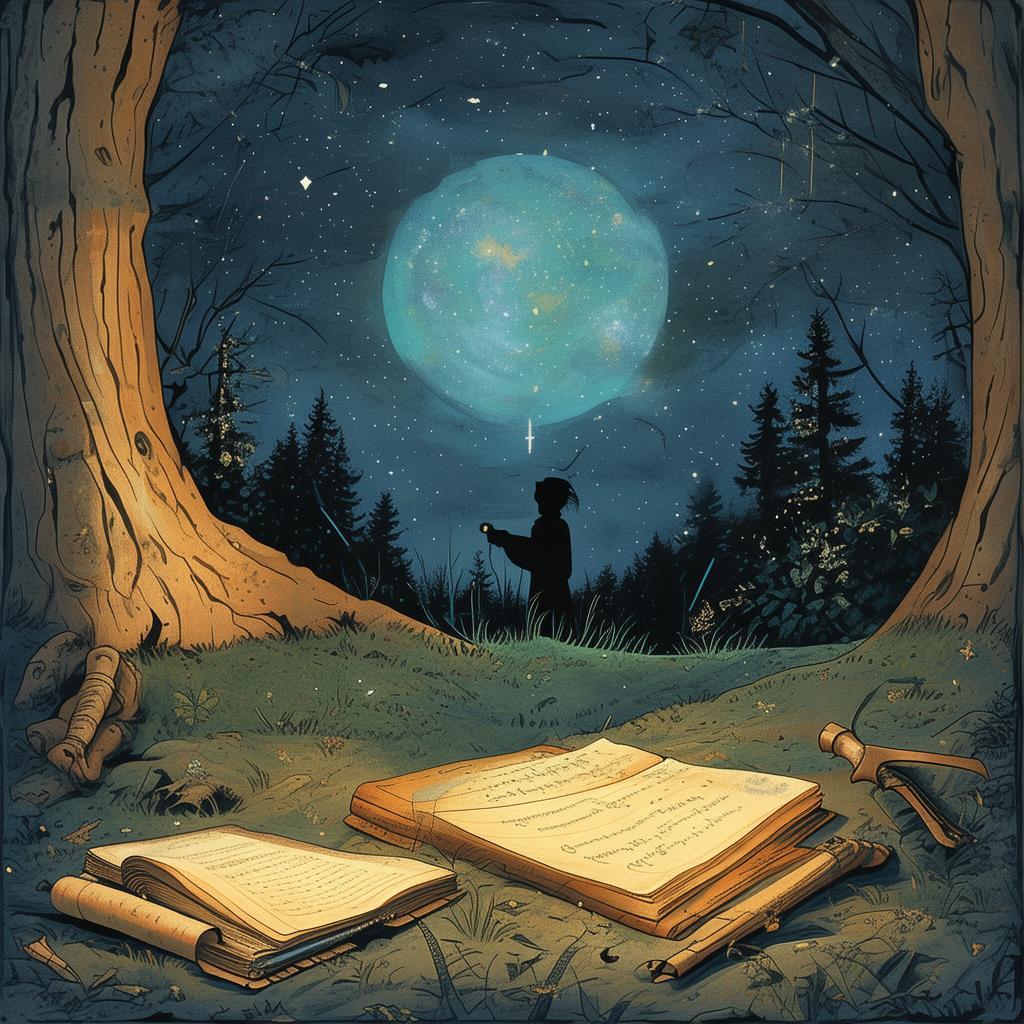Whispers of War: A Symphony of Betrayal
The air was thick with the scent of fear and the distant echo of marching boots. Vienna, 1939, was a city on the brink of war. In the heart of the city, amidst the hustle and bustle of daily life, lived a young violinist named Elena. Her fingers danced effortlessly across the strings of her beloved violin, the music a soothing balm to the chaos surrounding her.

Elena's life was simple yet rich. She spent her days practicing in the attic of her grandmother's house, her nights performing in the small cafes that dotted the city. Her music was a beacon of hope, a reminder of the beauty that still existed in a world on the cusp of destruction. But Elena was no ordinary violinist; she was a conduit for the symphony of the soul, a vessel for the unspoken emotions of the people around her.
One evening, as she sat in the attic, her grandmother called her down. "Elena, you must come. There is a man here who needs your help."
Elena found herself face-to-face with a man she had never seen before. He was older, with piercing eyes that seemed to see straight through to her soul. His name was Heinrich, and he was a member of the resistance. He had come to ask Elena for a favor: to compose a piece of music that could be used to communicate a message of hope and defiance to the members of the resistance.
The task was daunting, but Elena agreed. She knew that her music could be the key to the resistance's survival. Over the next few days, she worked tirelessly, her violin the only companion in the quiet room. The music that emerged was hauntingly beautiful, a symphony of despair and hope that seemed to resonate with the very walls of the room.
As the war escalated, Elena's music began to spread. It was played in secret meetings, whispered through the streets, and sung by the resistance in the dead of night. It became a symbol of unity and defiance, a testament to the human spirit's indomitable will to survive.
One evening, as Elena performed in a small cafe, a man approached her. "Elena, your music has given us hope. But we need you to do more. We need you to compose a piece that can be used as a signal. A call to action."
Elena's heart raced. She knew the risk, but she also knew the importance of the mission. She composed a new piece, one that would serve as the resistance's call to arms. The music was powerful, a blend of urgency and determination that seemed to stir the very air around her.
The day of the signal arrived. Elena stood on a rooftop, her violin in hand, as the first notes of her composition filled the air. The resistance responded immediately, and soon the city was alive with the sound of defiance. The music was a beacon, a guiding light in the darkness.
But the war was brutal, and the resistance was under constant threat. One evening, as Elena performed in a small, dimly lit room, a voice called out from the shadows. "Elena, we need to move. The Gestapo is closing in."
Elena's heart sank. She had known this day would come, but it was still a shock. As she stepped outside, she felt a hand on her shoulder. It was Heinrich, his face pale and his eyes filled with fear.
"Elena, we need to go. Now."
Before she could respond, a shot rang out. Heinrich fell to the ground, his eyes wide with shock. Elena's world shattered as she watched him die. She had been betrayed.
Returning to her grandmother's house, Elena found the music she had composed for the resistance. As she played the piece, she realized that it was a requiem for Heinrich. Her music had failed him, and she was consumed with guilt.
The next day, as Elena performed in the same cafe, she played the requiem. The music was haunting, a reflection of her inner turmoil. As she played, a man approached her. It was a member of the resistance, his eyes filled with tears.
"Elena, your music saved us. Your requiem is a testament to the human spirit."
Elena's heart swelled with gratitude and sorrow. She had been betrayed, but her music had also been a force for good. She realized that the symphony of her life was not about the notes she played, but about the emotions she conveyed.
As the war ended, Elena's music became even more powerful. It was a testament to the resilience of the human spirit, a reminder that even in the darkest times, hope could be found. Elena's story spread far and wide, her music a beacon of light in a world that was just beginning to heal.
In the years that followed, Elena continued to perform, her violin a reminder of the sacrifices made during the war. Her music was a symphony of hope, a reminder that even in the face of darkness, the human spirit could shine brightly.
The story of Elena and her symphony of betrayal became a legend, a testament to the power of music and the strength of the human heart. Her music would live on, a reminder that even in the darkest of times, there was always a chance for redemption and renewal.
✨ Original Statement ✨
All articles published on this website (including but not limited to text, images, videos, and other content) are original or authorized for reposting and are protected by relevant laws. Without the explicit written permission of this website, no individual or organization may copy, modify, repost, or use the content for commercial purposes.
If you need to quote or cooperate, please contact this site for authorization. We reserve the right to pursue legal responsibility for any unauthorized use.
Hereby declared.









